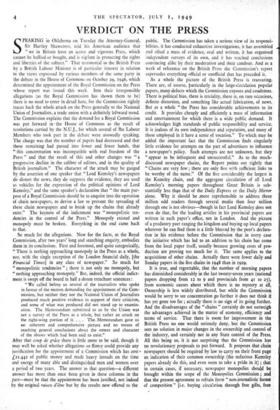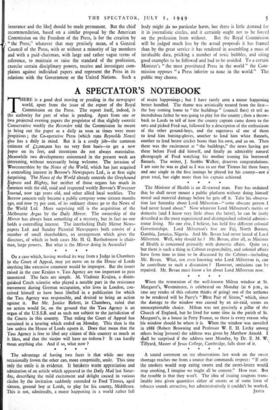VERDICT ON THE PRESS
SPEAKING in Oklahoma on Tuesday the Attorney-General, Sir Hartley Shawcross, told his American audience that " we in Britain have an active and vigorous Press, which cannot be bullied or bought, and is vigilant in protecting the rights and liberties of the subject." That testimonial to the British Press by a British Labour Minister is of particular interest in relation to the views expressed by various members of the same party in the debate in the House of Commons on October 29, 1946, which determined the appointment of the Royal Commission on the Press whose report was issued this week. Into their irresponsible allegations (as the Royal Commission has shown them to be) there is no need to enter in detail here, for the Commission rightly traces back the whole attack on the Press generally to the National Union of Journalists, a trade union with a definitely leftward trend. The Commission explains that the demand for a Royal Commission was put forward in • the House of Commons as the result of resolutions carried by the N.U.J., for which several of the Labour Members who took part in the debate were avowedly speaking. The charge was that the number of papers had decreased and that those remaining had passed into fewer and fewer hands, that " this concentration was incompatible with real freedom of the Press " and that the result of this and other changes was " a progressive decline in the calibre of editors, and in the quality of British journalism." The character of the attack may be gauged by the assertion of one speaker that " Lord Kemsley's newspapers do distort the news, they do suppress the evidence, they are used as vehicles for the expression of the political opinions of Lord Kemsley," and the same speaker's declaration that " the main pur- pose of a Royal Commission should be to enquire into the operation of chain newspapers, to devise a law to prevent the spreading of these chain newspapers and to break up the chains that already exist." The keynote of the indictment was " monopolistic ten- dencies in the control of the Press." Monopoly existed and monopoly must be broken. Everything in the end came back to that.
So much for the allegations. Now for the facts, as the Royal Commission, after two years' long and searching enquiry, embodies them in its conclusions. First and foremost; and quite categorically, " There is nothing approaching monopoly in the Press as a whole, nor, with the single exception of the London financial daily, [the Financial Times] in any class of newspaper." So much for " monopolistic tendencies " ; there is not only no monopoly, but " nothing approaching monopoly." But, indeed, the official indict- ment is swept off the board in half a dozen trenchant sentences :
" We called before us several of the journalists who spoke in favour of the motion demanding the appointment of the Com- mission, but neither they nor the National Union of Journalists produced much positive evidence in support of their criticism, and some of what was produced did not stand up to examin- ation. The Memorandum submitted to us by the Union was not a survey of the Press as a whole, but rather an attack on the right-wing portion of it. . . . The. Memorandum gave us no coherent and comprehensive picture and no means of reaching general conclusions about the extent and character of the abuses which had been said to exist."
After that coup de grace there is little more to be said, though it may well be asked whether allegations so flimsy could provide any justification for the appointment of a Commission which has cost. £21,442 of public money and made heavy inroads on the time and energy of many able and distinguished men and women over a period of two years. The answer to that question—a different answer has more than once been given in these columns in the past—must be that the appointment has been justified, not indeed by the original raison d'être but by the results now offered to the public. The Commission has taken a serious view of its responsi- bilities, it has conducted exhaustive investigations, it has assembled and sifted a mass of evidence, oral and written, it has organised independent surveys of its own, and it has reached conclusions convincing alike by their moderation and their candour. And as a work of reference on the British Press the Commission's report supersedes everything official or unofficial that has preceded it.
As a whole the picture of the British Press is reassuring. There are, of course, particularly in the large-circulation popular papers, many defects which the Commission exposes and condemns. There is political bias, there is triviality, there is, on rare occasions, definite distortion, and something like actual fabrication, of news. But as a whole " the Press has considerable achievements to its credit. It provides cheaply and efficiently a mass of information and entertainment for which there is a wide public demand. It acknowledges high standards of public responsibility and service. It is jealous of its own independence and reputation, and many of those employed in it have a sense of vocation." To which may be added the important fact that the Commission finds singularly little evidence for attempts on the part of advertisers to influence a newspaper's policy. Such attempts are not unknown, but they " appear to be infrequent and unsuccessful." As to the much- discussed newspaper chains, the Report points out rightly that " Chains are very few ; there are only five with sufficient links to be worthy of the name." Of the five considerably the largest is the Kemsley chain, and the aggregate circulation of all Lord Kemsley's morning papers throughout Great Britain is sub- stantially less th4n that of the Daily Express or the Daily Mirror alone. Why it should be .more reprehensible to address three million odd readers through several media than four million through one is not obvious—though in fact Lord Kemsley does not even do that, for the leading articles in his provincial papers are written in each paper's office, not in London. And the picture of a predatory peer ranging the kingdom and buying up local papers wherever he can find them is a little blurred by the peer's declara- tion in his evidence before the Commission that in every case the initiative which has led to an addition to his chain has come from the local paper itself, usually because growing costs of pro- duction are proving too much for it. The same applies to the acquisitions of other chains. Actually there were fewer daily and Sunday papers in the five chains in 1948 than in 1929.
It is true, and regrettable, that the number of morning papers has diminished considerably in the last twenty-seven years (national papers dropping from 12 to 9 and provincials from 41 to 25), from economic causes about which there is no mystery at all. Ownership is less widely distributed, but while the Commissioi would be sorry to see concentration go further it does not think if has yet gone too far ; actually there is no sign of its going further. And the disadvantages of the "chains " certainly do not outweigh the advantages achieved in the matter of economy, efficiency and terms of service. That there is room for improvement in the British Press no one would seriously deny, but the Commission sees no solution in major changes in the ownership and control of the industry, and certainly not in any State control of the Press. All this being so, it is not surprising that the Commission has no revolutionary proposals to put forward. It proposes that chain newspapers should be required by law to carry on their front page an indication of their common ownership (the nefarious Kemsley papers already do this, and even seem to take a pride in it) ; that in certain cases, if necessary, newspaper monopolies should be brought within the scope of the Monopolies Commission ; that the present agreement to refrain from " non-journalistic forms of competition " [i.e. buying circulation through free gifts, free







































 Previous page
Previous page